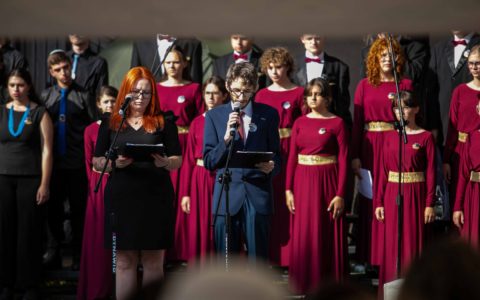POŻEGANANIE TYCH, KTÓRYCH HISTORIA WYMAZAŁA – przemówienie dr. Łukasza Połomskiego
ENG BELOW
Sierpniowego wieczoru, w 2009 r. tutaj niedaleko, na placu Trzeciego Maja zapaliłem znicza z ocalonym z Holokaustu i strażnikiem pamięci sądeckich Żydów, Jakubem Mullerem. Było nas dwóch, a Jakub powiedział, że chociaż był by sam, to będzie pamiętał, modlił się i wspominał pomordowanych. Przechodząc tymi uliczkami wskazał mi ten skwer i powiedział, że on czeka na godne upamiętnienie jego sióstr i braci. W 2010 r. Jakub zmarł, ale dzięki Sądeczanom nie umarła pamięć, a skwer czekał. Sądeczanie, dopingowaliście nas w działaniach, braliście udział w naszych wydarzeniach. Kilka lat później, razem z Arturem Franczakiem spotkałem Darka Popielę, który był oszołomiony, że po 1/3 mieszkańców miasta został tylko postument. Pamiętam dobrze, powiedziałeś wówczas Darku, że jak w Nowym Sączu do 18 urodzin Twojej najstarszej córki nie powstanie godne upamiętnienie Ofiar Holokaustu to się z tego miasta wyprowadzisz. Nie mogliśmy do tego dopuścić. Dziś razem wypełniamy testament Jakuba Mullera oraz innych ocalałych. W głowie mam słowa 97-letniego Markusa Lustiga, który kiedy usłyszał o powstającym skwerze powiedział, że to jeszcze jedno zwycięstwo nad Hitlerem. Tak, to zwycięstwo nad zapomnieniem, nad ciszą jaka wisiała tutaj przez 80 lat. Dzisiejsza uroczystość jest dla mnie jak pożegnanie 11 966 ludzi, z imienia i nazwiska. To pożegnanie dla tych, których historia wymazała, a których poznawałem przez niemal 15 ostatnich lat. To historia Estery Berhang, która prowadziła sklep w rodzinnej wsi mojej babci i Icka Ringa z Miłkowej, który dostał się w ręce Niemców zimą 1940 r., kiedy złamał akurat nogę jeżdżąc ostatni raz na nartach. To historia cukiernika Kalmana Sieradzkiego z Lwowskiej, obok kamienicy którego niemal codziennie przechodzę, czy braci Ende z Zalewskiego. To historia dr Heleny Żupnik zastrzelonej w Librantowej, znakomitej lekarki i Malci Katz, małej dziewczynki, która umarła z głodu w bramie obok, na ul. Kazimierza. Ich wszystkich wymienionych na tablicach pragniemy dziś przywołać. „Krwią wojny nie wygrasz” – te słowa w kwietniu napisała do Sądeczan z okazji 80. Rocznicy Akcji Kwietniowej Sara Melzer. Te słowa ciągle brzmią nam w uszach, tak jak wołanie wszystkich, którzy stali z nami tutaj w czasie rocznic likwidacji getta: Mońka Goldfingera, Markusa Lustiga. I choć słowa „Nigdy więcej” dziś brzmią jak banał, jak nieodrobione zadanie, tylko one wydają się odpowiednie wobec ogromu tragedii, którą upamiętniamy.
English
On an August evening in 2009, a few steps from here, in Third of May Square, I lit a candle with Jakub Miller, a Holocaust survivor and guardian of the memory of the Jews of Nowy Sącz. There were two of us, and Jakub said that even if here were to be here alone, he would remember, pray and remember the murdered. As we walked along these streets, he pointed out this square to me and said he was waiting for his sisters and brothers to be commemorated in a dignified way.
In 2010, Jakub died, but thanks to the people of Nowy Sącz, the memory did not die, and the square waited. Dear Nowy Sącz inhabitants, you have been cheering us on in our activities, you have been taking part in our events.
A few years later, together with Artur Franczak, I met Darek Popiela, who was stunned that a pedestal is the only trace left of one third of the town’s inhabitants. I remember well, Darek: you said at the time that if a dignified commemoration of the Holocaust Victims would not have been built in Nowy Sącz by the time your eldest daughter turns 18, you would move out of the city.
We could not let that happen. Today, together, we are fulfilling the will of Jacob Muller and other survivors. The words of 97-year-old Markus Lustig keep ringing in my ears, who, upon hearing about a commemoration being created in the squar, said that it was yet another victory over Hitler. Yes, it is a victory over oblivion, over the silence that has hung here for 80 years. For me, today’s ceremony is like saying goodbye to 11 966 people, by name. It is a farewell to those whom history has erased, and whom I have come to know over the last 15 years. It is the story of Esther Berhang, who ran a shop in my grandmother’s home village, and of Itzek Ring from Miłkowa, who fell into the hands of the Germans in the winter of 1940, when he broke his leg skiing for the last time. This is the story of Wiesiek and Mietek Templer, who should be my neighbours today. It’s the story of confectioner Kalman Sieradzki from Lwowska Street, whose tenement house I walk by almost every day, or the Ende brothers from Zaleski Street. It is the story of Dr Helena Żupnik, who was shot in Librantowa, an excellent doctor, and of Malcia Katz, a little girl who died of starvation in the gate next door on Kazimierza Street. We wish to recall them all today, listed on the tablets. „You cannot win a war with blood”, wrote Sara Melzer to the people of Sącz on the occasion of the 80th anniversary of the April „Action”. These words still ring in our ears, as does the cry of all those who stood with us here during the anniversaries of the liquidation of the ghetto: Moniek Goldfinger, Markus Lustig. And although the words „Never again” today sound like a cliché, like unfinished homework, they alone seem appropriate in the face of the enormity of the tragedy we are commemorating.


